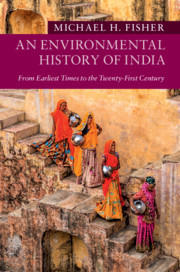Description
An Environmental History of India
From Earliest Times to the Twenty-First Century
New Approaches to Asian History Series
Author: Fisher Michael H.
This longue durée survey of the Indian subcontinent's environmental history reveals the complex interactions among its people and the natural world.
Language: English
Subject for An Environmental History of India:
Approximative price 104.06 €
In Print (Delivery period: 14 days).
Add to cart
An Environmental History of India
Publication date: 10-2018
312 p. · 15.8x23.5 cm · Hardback
Publication date: 10-2018
312 p. · 15.8x23.5 cm · Hardback
Approximative price 31.58 €
In Print (Delivery period: 14 days).
Add to cart
An Environmental History of India
Publication date: 10-2018
312 p. · 15.3x22.7 cm · Paperback
Publication date: 10-2018
312 p. · 15.3x22.7 cm · Paperback
Description
/li>Contents
/li>Biography
/li>
India, Pakistan, and Bangladesh contain one-fifth of humanity, are home to many biodiversity hotspots, and are among the nations most subject to climatic stresses. By surveying their environmental history, we can gain major insights into the causes and implications of the Indian subcontinent's current conditions. This accessible new survey begins roughly 100 million years ago, when continental drift moved India from the South Pole and across the Indian Ocean, forming the Himalayan Mountains and creating monsoons. Coverage continues to the twenty-first century, taking readers beyond independence from colonial rule. The new nations of India, Pakistan, and Bangladesh have produced rising populations and have stretched natural resources, even as they have become increasingly engaged with climate change. To understand the region's current and future pressing issues, Michael H. Fisher argues that we must engage with the long and complex history of interactions among its people, land, climate, flora, and fauna.
1. Introduction; 2. Locating and shaping India's physical environment and living populations; 3. Indus and Vedic relationships with Indian environments (c.3500 BCE–c.600 BCE); 4. The environment and forest-dweller, late Vedic, Hindu, Jain, Buddhist, and Dravidian cultures, societies, and states (c.600 BCE–c.800 CE); 5. Insiders, Jewish, Christian, and Muslim immigrants, and the environment (c.700–c.1600); 6. Mughal empire (1526–1707); 7. Mughal imperial fragmentation, regional state rise, popular environmental movements, and early British colonial policies and institutions (c.1700–1857); 8. The British Raj, 'Mahatma' Gandhi, and other anti-colonial movements (1857–1947); 9. West and East Pakistan and India following independence (1947–71); 10. India, Pakistan, and Bangladesh from Stockholm to Rio (1971–92); 11. India, Pakistan, and Bangladesh into the twenty-first century; 12. National, subcontinental, and global issues in South Asia; Bibliographic essay.
Michael H. Fisher is Danforth Professor of History, Emeritus, at Oberlin College, Ohio. He is the author of numerous books, including Migration: A World History (2013) and A Short History of the Mughal Empire (2015).
© 2024 LAVOISIER S.A.S.

